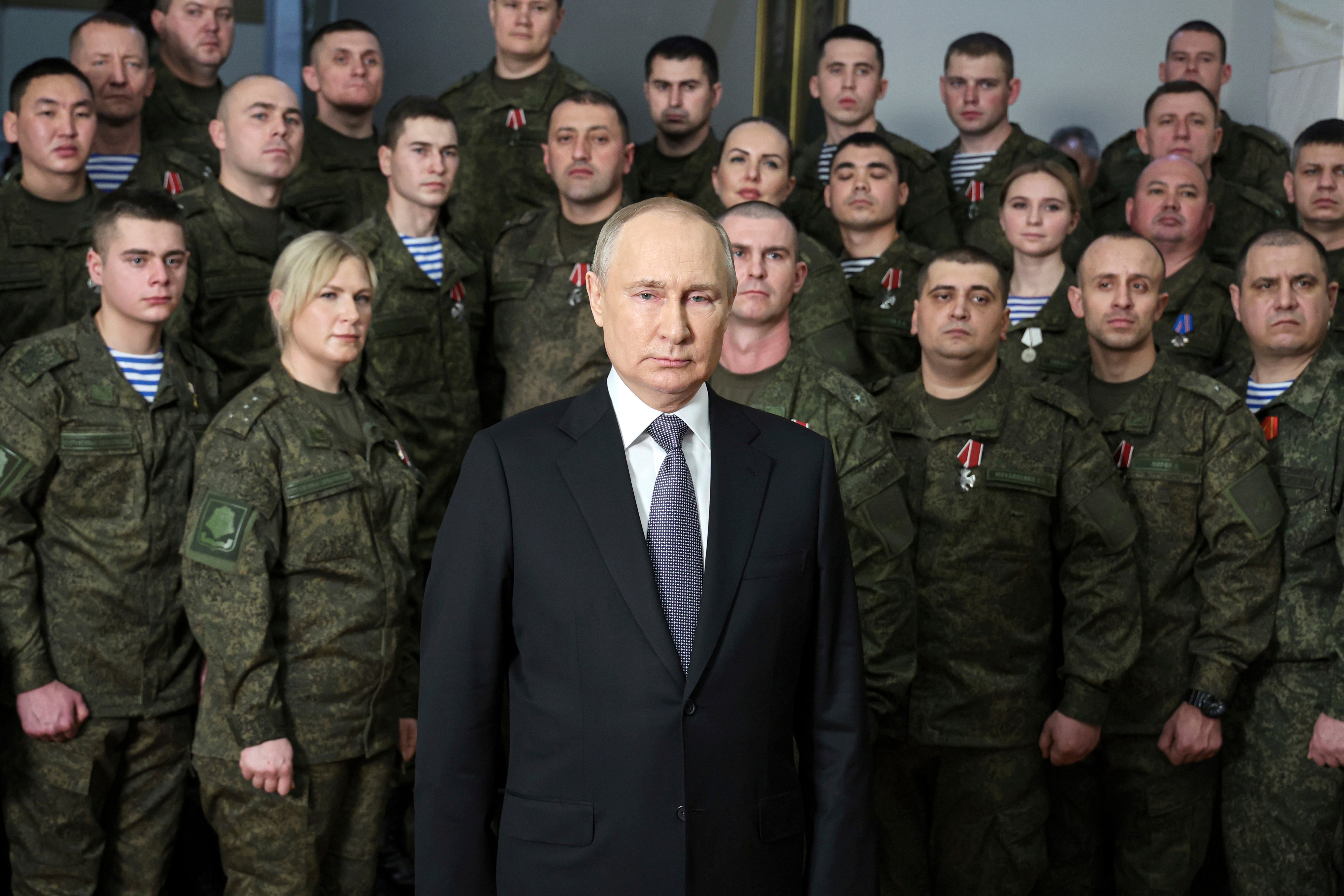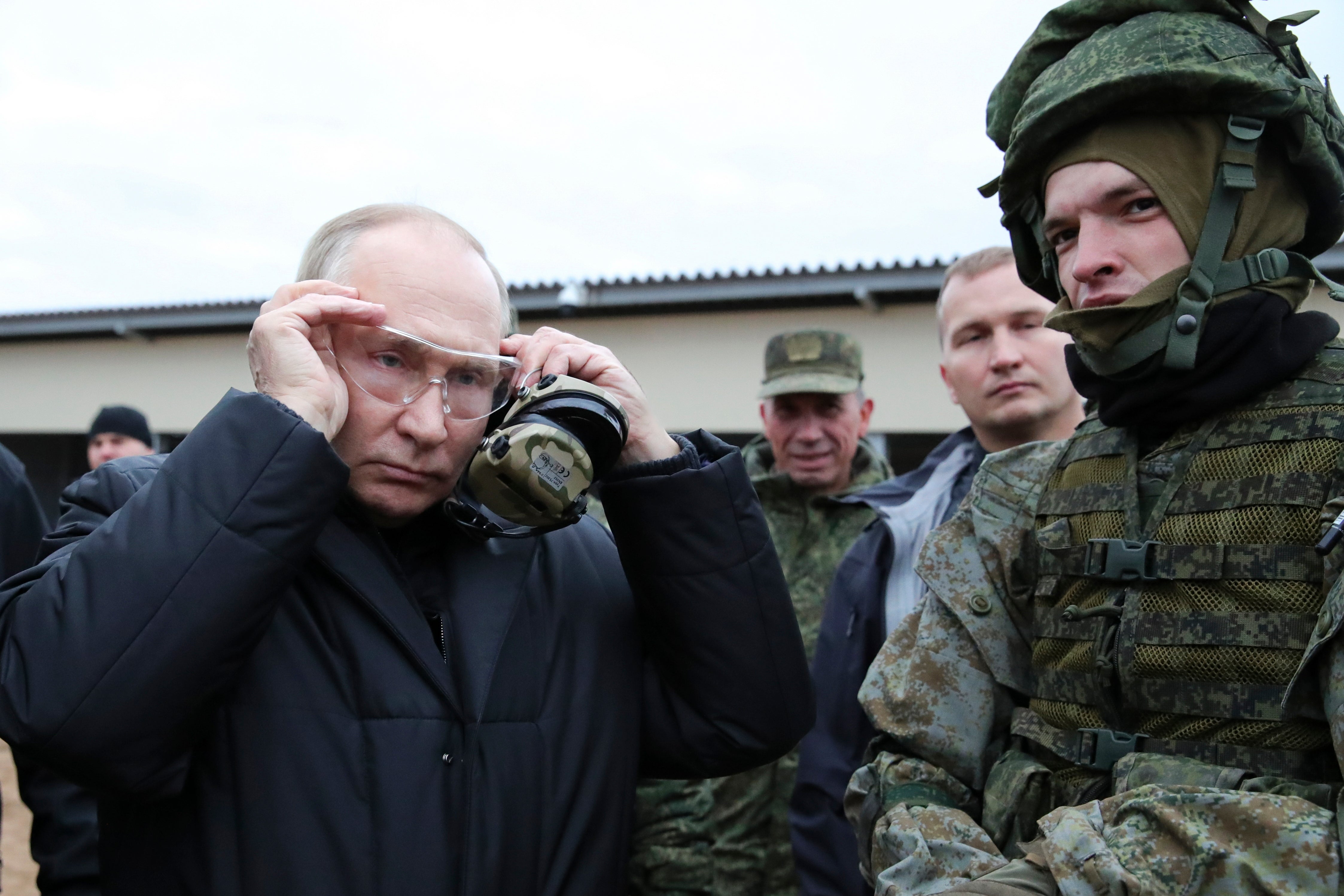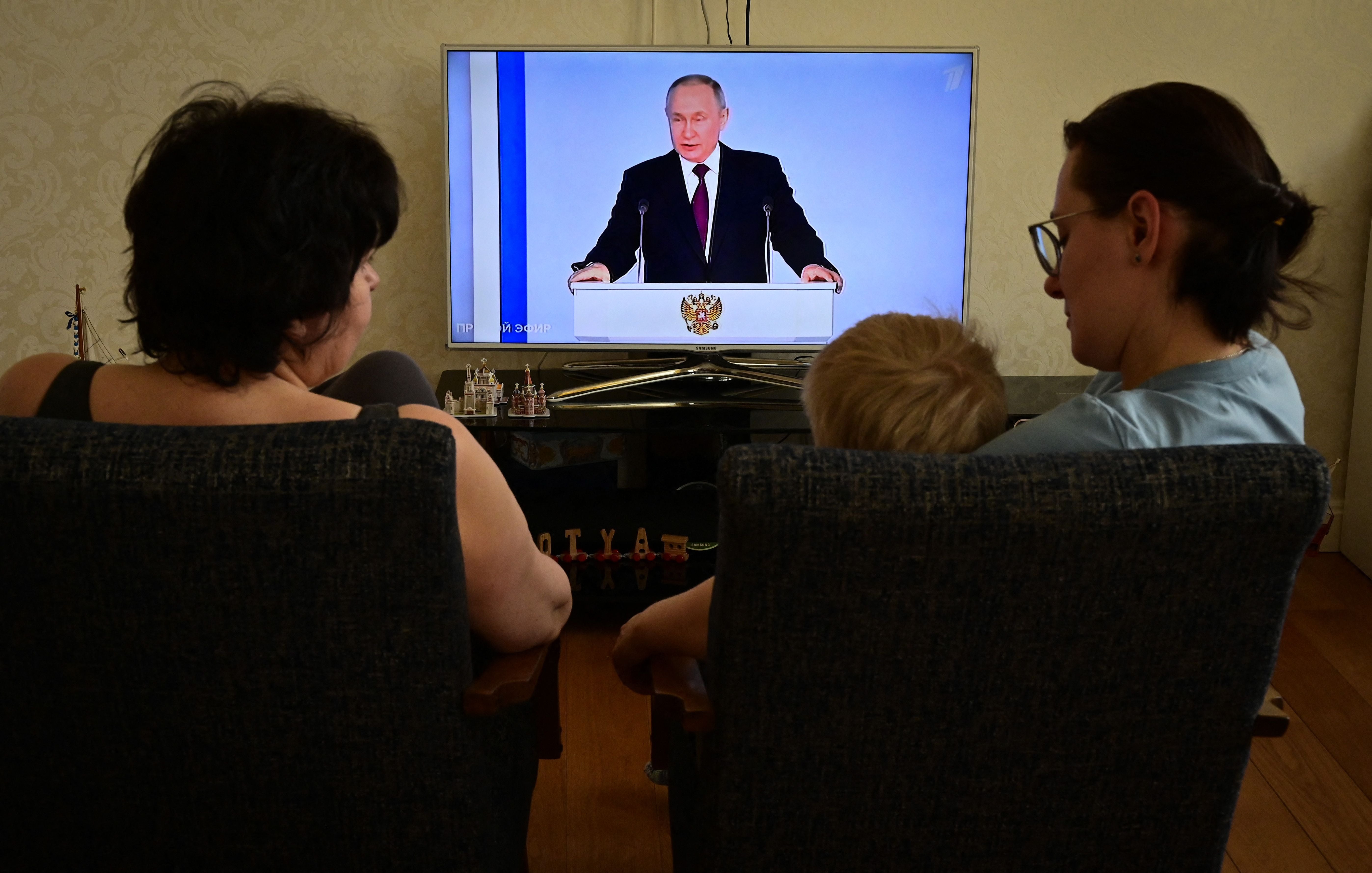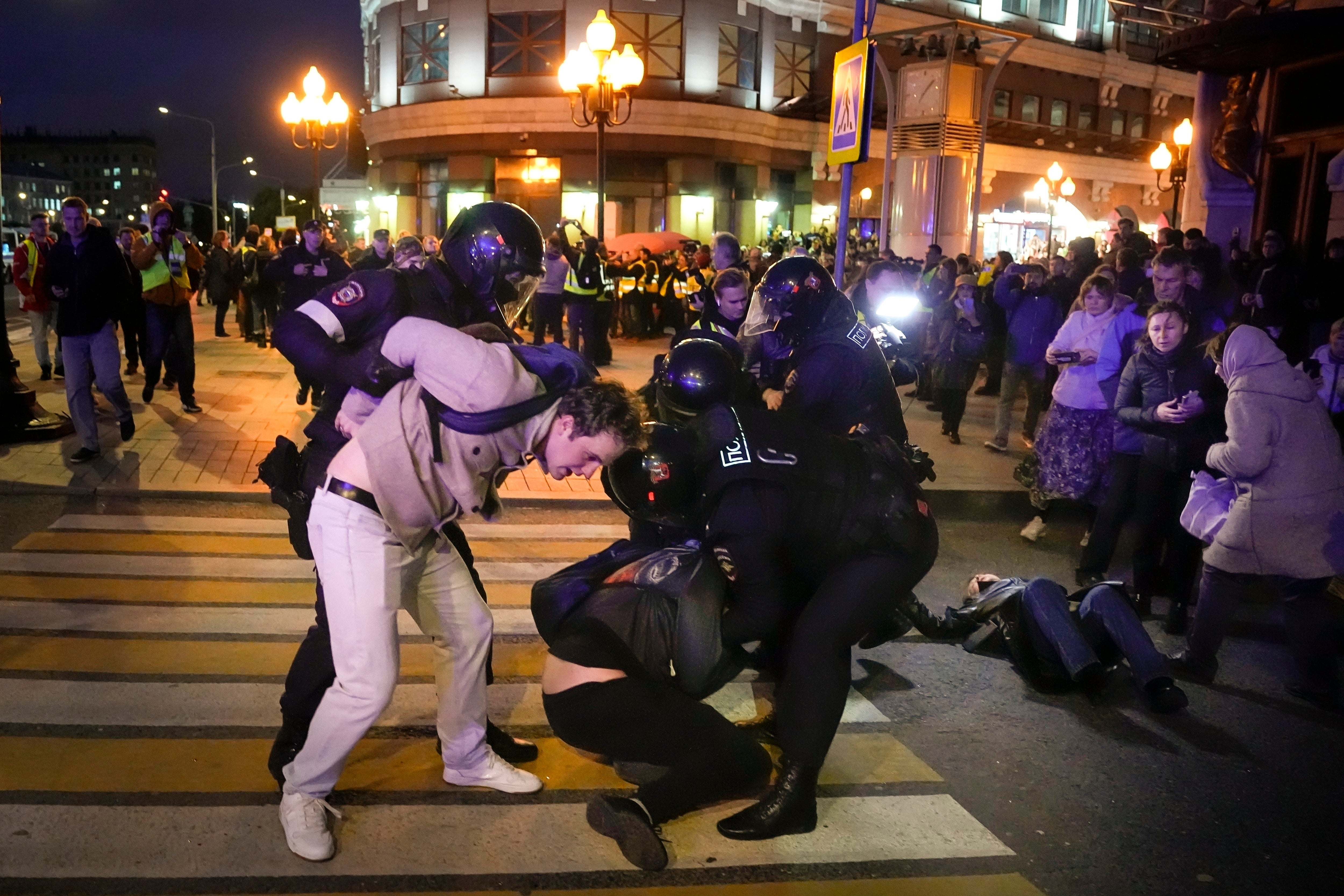Vladimir Putin: What is driving Russian leader’s relentless assault on Ukraine?
He sold the invasion as a collective decision with his military chiefs, but it is the president alone who will have to answer to history, writes Mary Dejevsky


Your support helps us to tell the story
From reproductive rights to climate change to Big Tech, The Independent is on the ground when the story is developing. Whether it's investigating the financials of Elon Musk's pro-Trump PAC or producing our latest documentary, 'The A Word', which shines a light on the American women fighting for reproductive rights, we know how important it is to parse out the facts from the messaging.
At such a critical moment in US history, we need reporters on the ground. Your donation allows us to keep sending journalists to speak to both sides of the story.
The Independent is trusted by Americans across the entire political spectrum. And unlike many other quality news outlets, we choose not to lock Americans out of our reporting and analysis with paywalls. We believe quality journalism should be available to everyone, paid for by those who can afford it.
Your support makes all the difference.In the year since Russia launched its invasion of Ukraine, Vladimir Putin has been the figurehead of what he initially termed a “special military operation”. Russia’s president might have prepared the political ground with a show of collective responsibility – few will forget how he solicited the support of key ministers live on TV just hours before ordering the invasion – but he has fronted the invasion ever since, often alone, and it is he who will answer to history.
From the start, Russia’s military action tended to be seen as an old-fashioned war launched by an old-fashioned autocrat. As such, it was as surprising as it was shocking to all those who believed such wars to be over, at least in Europe. The scenes that have dominated our television screens ever since have been tragically reminiscent of black-and-white newsreel showing battles for the very same cities during the Second World War.
But the supposedly old-fashioned autocrat who gave the orders for this war is a more complicated figure than many think.
Born in 1952, as a post-war baby in what was then Leningrad – now St Petersburg – he reached his “three score and 10” on 7 October last year. His early school years coincided with the “thaw” by Nikita Khrushchev – an easing up after the political and cultural repressions of Stalin. He was in his late twenties when the Soviet Union began what became its disastrous intervention in Afghanistan, and in his mid-thirties when Mikhail Gorbachev embarked on his – eventually doomed – efforts to reform the Soviet system. By this time, Putin was married with two daughters.
He was in his 40th year when the Soviet Union collapsed, and approaching 50 when Boris Yeltsin designated him his successor on the final day of 1999. He has been at the helm of Russia now for more than 20 years, visibly increasingly his authority as each year has gone by, and always with a hard edge. At home, this was seen in regular crackdowns on civil society – including the attempted poisoning and imprisonment of the opposition figure Alexei Navalny. Abroad, he has been blamed for the radiation poisoning of Alexander Litvinenko and the chemical attack on the Skripals in Salisbury. The Kremlin has denied involvement in these and other suspected cases.
How, or when, Putin’s tenure might come to an end is a question that might well have loomed larger over the past year without the war. A presidential election is due next year and a controversial constitutional reform from 2020 allows him to stand for election beyond his current fourth term. So he could, under the current constitution, “go on and on”. Despite suggestions of ill-health, he has shown no inclination to retire. When he and his wife divorced in 2014 – announcing it on state TV after an evening at the Bolshoi ballet – he said one reason was that he had had no time for anything except work.

At this point, it is perhaps worth standing back for a moment and considering what a cataclysmic series of events Putin and other Russians of his generation have lived through, even before this war. Their early youth was marked by the optimism of the Khrushchev years, only for those hopes to be dashed. Gorbachev raised hopes again, but made life much less predictable, as established career paths disappeared, state supply structures broke down, and those with an appetite for risk were rewarded.
The dissolution of the Soviet Union is the historical turning point, but the actual event was remarkably – miraculously, some would say – peaceful and low-key, although the Ukraine war must now be seen as part of the longer-term fallout. For Russians in general, the experience of the USSR’s demise was essentially one of economic collapse. The other 14 republics that made up the Soviet Union went their own way, and Russia was left picking up most of the bills. Hyperinflation impoverished professionals, many of whom were forced into casual work, including driving taxis (as Putin did), and elderly people were reduced to hawking their possessions on the street. It was not until Putin was made prime minister in 1999, as a prelude to becoming president, that some sort of order started to be restored. Much of his popularity in Russia rests on this, even to this day.
This is the backdrop. But then there are Putin’s individual circumstances and character. His family survived the Leningrad siege, when thousands starved, but his elder brother died at the age of two before Vladimir was born (another brother had previously died in infancy). His father returned disabled from the war, and the family lived in a “communal” flat, where families shared kitchen and bathroom facilities, which created predictable tensions. Putin was small and puny as a child, and took up martial arts – in part, it would appear, to defend his corner.
Inspired, it seems, by a popular Soviet spy film, he wanted to become a Russian James Bond, but was initially turned down as too young and under-qualified. He was sent off to improve his prospects, and took a law degree at what was then Leningrad University – a prestigious department, by the way, at a prestigious university. He was singled out for the foreign intelligence service –- though opinions seem to differ about how competent he was – and he was serving at the Soviet mission in Dresden as communism collapsed, country by country, across eastern Europe.

Witnessing the communists lose control of East Germany – hitherto the most ostensibly loyal to Moscow of the Eastern bloc states - has to have marked him for life. It also presented him with a personal dilemma. Two years before the Soviet Union was to collapse, Putin switched sides. He took the decision to leave the KGB, and went to work for one of the most progressive administrations in Soviet Russia, the city council of Leningrad – soon to regain its original name of St Petersburg – which was led by the lawyer and democracy campaigner Anatoly Sobchak.
What is not clear – and this is one of the murkier spells of Putin’s career – is whether he truly gave up his first love, the KGB, or remained a spy (as in the “once a KGB man, always a KGB man” cliche), even as he went to work for what became the new order. My sense, and it is only a sense, is that he threw in his lot with his former law professor – partly out of desperation (where else could he find work to support his family in a country whose political order seemed so in flux?), but partly because he understood which way the wind was blowing.
In 1996, when Sobchak lost his bid for re-election, Putin’s personal contacts facilitated a not altogether welcome move to Moscow and an introduction to the Yeltsin clan. The rest, pretty much, is history – or it was, until the Ukraine war.
Pop-psychology has a field day with Putin: the puny street fighter who beat the bullies; the disillusioned KGB believer who saw the light; the fitness fanatic – remember the bareback horse-riding, deep-sea-diving macho man. And those traits have been wheeled out time and again to help explain why Putin translated his frustration in the face of what he would see as an all-conquering Nato alliance and the growing westward orientation of Ukraine, into an all-out invasion of Ukraine.
Such considerations are part of the picture. But they are far from complete. In the years that Putin has led Russia, either as president or prime minister, his authority – in bearing and speech – has increased immeasurably, but he has retained an ability to switch registers at will: from coldly inscrutable, to fiercely angry, to quizzical. Even in his anger, however, he usually appears highly controlled. He shows what he wants to show; no more.

But there are times when anger seems to get the better of him. One such occasion came in 2004, early on in his presidency, when Chechen fighters besieged a school in Beslan in southern Russia and more than 300 people died. He has struck the same tone – of frustration, impatience and almost personal resentment, spattered with crude, barrack-room language – when talking about Ukraine and what he sees as the West’s intransigence over Nato enlargement. As Russian forces mounted their first air raid on Ukraine, he dismissed its leaders as “drug addicts” and “neo-Nazis”, and he has hardly moderated his language since.
Anger may well be a motivation for Putin to act as he has. But there are at least three other popular preconceptions about what makes him tick that I would challenge. The first is that he is lord and master of all he surveys – a latterday Tsar if you like. Before the Ukraine war there was plenty of evidence that regional officials could and did operate outside Moscow’s control. The war has no doubt reduced their room for manoeuvre, but some regions acted on the instruction to mobilise reservists more diligently than others.
A second concerns the speculation about his vast (and, it is alleged, corruptly acquired) wealth. This is one of the many sticks Navalny has used to attack the current order in Russia. But while people around Putin have certainly benefited mightily from their association, it seems to me that wealth is not what primarily motivates Putin
And a third – most pertinent in the context of the Ukraine war – is the accusation that his ambition is to restore the Soviet Union or the Russian Empire. He is on record as saying: “Anyone with a heart cannot fail to regret the passing of the Soviet Union, but no one with a head could possibly want to bring it back.”
Putin’s central motivation, since his earliest years as president, may well have been to restore Russia’s standing in the world after what he saw as the humiliation of the Soviet collapse. But according to Russian state media and his own statements, considerations of Russia’s security are paramount in his view. One could put the 2008 Georgia war and the annexation of Crimea in 2014 into this category: a profound fear that the West was making inroads into what he regarded as Russia’s security cordon.
This same rationale is what he says lay at the heart of his decision to invade Ukraine, a country he saw then, and sees now, as having been groomed by the West to make inroads into Russia and even change its regime.
Since the invasion, questions have been raised repeatedly in the West about popular support for the war and the stability of Putin’s rule in Russia. A spate of street protests early on were crushed; brave individuals have staged their own protests, but nothing has come near to threatening Putin’s rule or forcing a halt to the war. Most Russians have rallied around the flag, helped by the appeals to the spirit of the Second World War – the Soviet Union’s Great Patriotic War – much of which was fought in and around Ukraine.
That said, popular sentiment in conditions of mobilisation and war censorship is hard to gauge, and could turn in an instant – not least because Putin’s demographic is becoming an ever smaller minority in Russia. One year on from the invasion, however, Putin’s power has weathered the early military and diplomatic setbacks and shows little sign of changing course. Those hoping that the Ukraine war will bring his downfall may have some time yet to wait.






Join our commenting forum
Join thought-provoking conversations, follow other Independent readers and see their replies
Comments